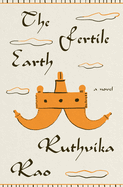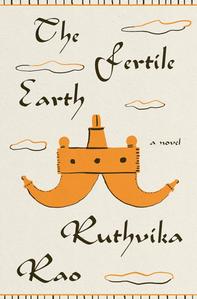
 Ruthvika Rao's ambitious and spellbinding debut novel, The Fertile Earth, is set during India's post-Partition years, from 1955 to 1990. It closely follows two families: the Deshmukhs, the zamindars of Irumi, "feudal landlords, rulers and administrators of law, taxation and cruelty"; and Pichamma, washerwoman to the Deshmukhs, and her two sons, Ranga and Krishna.
Ruthvika Rao's ambitious and spellbinding debut novel, The Fertile Earth, is set during India's post-Partition years, from 1955 to 1990. It closely follows two families: the Deshmukhs, the zamindars of Irumi, "feudal landlords, rulers and administrators of law, taxation and cruelty"; and Pichamma, washerwoman to the Deshmukhs, and her two sons, Ranga and Krishna.
Rao makes the sweeping changes happening in India during those years feel personal and intimate through the friendship and blossoming romance of Vijaya Deshmukh and Krishna, who live in Irumi, "a remote Telangana hamlet." Rao's opening scene throws readers into the middle of the conflict: it's 1970, and Kanakam, a tanner living on the rim of Irumi, witnesses the execution of the Deshmukh family. What led to this moment, and its aftermath, forms the foundation of Rao's piercing novel.
When Krishna defends Vijaya from a bullying classmate at school, she spits at Krishna's feet. However, after school, outside her home, she thanks him by offering him a sweet kalakand, a sensuous scene in which they share it, bite by bite. Vijaya then asks Krishna if he will go with her to hunt the man-eating tiger threatening the village. In Vijaya, Rao convincingly creates a rebellious spirit, indifferent to her privilege. If their friendship is forbidden, the tiger hunt is unthinkable. Yet rule-abiding Krishna gets drawn into Vijaya's plans. He brings his older, risk-taking brother, Ranga, along on the excursion, and Vijaya brings her younger sister, Sree, to seal the girl's silence. The cataclysmic event of the tiger hunt and its fallout ripples through each of the quartet's individual paths, forever changing them and their families.
Rao beautifully renders the characters of Krishna and Ranga; the core of who they are as boys shapes who they become as young men, and readers will become deeply invested in their fates. Vijaya--strong, rebellious, complicated--allows herself to be opened up by her alliance with Krishna, so that the surprising twists in her future remain credible, and her likability grows. The author movingly writes of the scars of the caste system, as Pichamma tells Krishna, "he will never in life be given the things he deserves, but only the things he earned."
Through her fully realized characters, Rao gives readers a window into the complexities of a nation still defining itself. Rather than offering readers answers, she invites them into the hard questions, reminding them that even the cruelest people are capable of compassion, and even the most sympathetic can be selfish; sometimes it's hard to know which is worse. --Jennifer M. Brown, reviewer
Shelf Talker: In her ambitious and spellbinding debut novel set during the post-Partition years in India, Ruthvika Rao gives readers a window into the complexities of a nation still defining itself.

